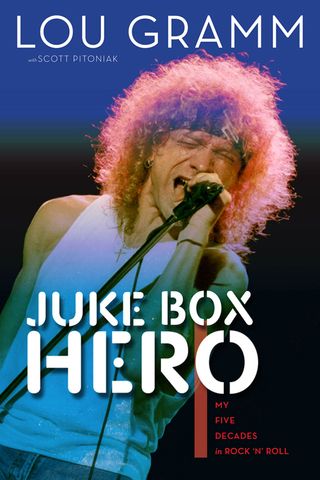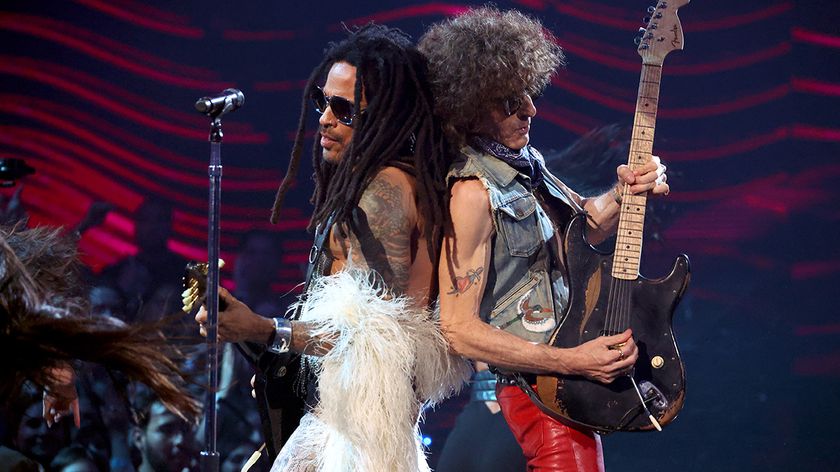Juke Box Hero: Lou Gramm Discusses New Autobiography and Foreigner

Former Foreigner vocalist Lou Gramm pulls no punches in his new autobiography, Juke Box Hero.
In the book, which was co-written with Scott Pitoniak, Gramm leads readers on a journey from his humble beginnings in Rochester, New York, to the biggest stages in the world. He recounts his stint with Black Sheep, plus the ups and downs of working with guitarist Mick Jones in the band that made him famous.
From the diagnosis that nearly took his life to his solo career success and fascination for muscle cars, Gramm’s book is an honest portrayal of self-reflection from one of the greatest voices in rock history.
I had the pleasure of speaking with Gramm to discuss Juke Box Hero and get his thoughts on being inducted with Jones into the Songwriters Hall of Fame on June 13.
GUITAR WORLD: What made you decide to write a book at this stage?
It was a good point in my life to write the book. I had a lot to talk about and fortunately, I remember all of it! [laughs]. Those were exceptional times with a lot of great groups, and I really wanted to tell my story.
What was the writing process like?
Get The Pick Newsletter
All the latest guitar news, interviews, lessons, reviews, deals and more, direct to your inbox!
Scott [Pitoniak] lives here in Rochester, and once a week he and I would meet at my recording studio for a few hours. It took almost a year and a half, but it was a good way to do it. We weren’t in any hurry and didn’t do it in any kind of chronological order. Scott would surprise me with questions from things that happened 30 years ago and then ask me others that were from six months ago.
Many of the questions would often instigate something, and I’d come up with an old story that usually had a funny end to it. Of course, there were also some questions that actually stirred up a little anxiety or anger, but I really wanted it to be off the cuff.
Prior to joining Foreigner, you were with Black Sheep when a van accident destroyed most of your equipment and ended your tour. Do you think if events had been different, that tour may have been the breakthrough for the band?
Who knows? We already had two albums out on Capitol and were opening for Kiss on a huge world tour. At one show we played in Boston, we received a standing ovation. Kiss’ management and crew were very good to us. Even though we were the opening act and knew we shouldn’t go back out, their tour manager told us to go answer our encore! If that accident didn’t happen, maybe that tour might have been our stepping stone.
One of the things I found intriguing about your time with Foreigner was that you always carried around notebooks everywhere you went. Tell me about that.
I always had a spiral-bound notebook or writing pad with me. I’d usually carry them around in a satchel and whenever I was reading a book or watching TV or a movie, if someone would say a phrase that caught my ear, I’d write it down. In my book of lyrics, I’d have song titles, verses and choruses all written out.
Can you give me an example of how that book came in handy?
I had just finished reading a book about the Civil War and remember they were talking about how guys in the heat of battle became hot blooded and would kind of come out of themselves and just be mean warriors. Of course, I wrote “hot blooded” down in one of my books. A few months later, Mick was playing me cassette tapes of some of the guitar ideas he had been working on. I heard this one particular riff and as I was looking through my book, that “hot blooded” part just jumped right out at me and I started singing it along with the riff. We both just went crazy because it sounded so good [laughs]. That’s when we started working on the song.
What was it like working with producer Mutt Lange on the 4 album?
Mutt was a nice guy; very knowledgeable and knew how to get the best out of you. But a lot of things he did at the time were derivative to AC/DC (because that’s where he had his success). So when he wanted you to do things a certain way, he’d say, “Do it like AC/DC did on this song." He’d often try to get me to sing like Brian Johnson. Now I could tear it up and sing tough songs, but I certainly didn’t sound like Brian Johnson. But Mutt was pushing me to go in that direction, so I pushed back. By that point, we already had completed three successful albums. So why would I want to change my vocal style?
How did you and Mick determine royalties for Foreigner songs?
At the end of recording every record, Mick and I would both sit down with a list of song titles. For each song, we’d write down on a little scrap of paper what we thought the split should be and then show it to each other. Most of the time it was pretty close: 50-50, 60-40, 55-45. But for the song "I Wanna Know What Love Is," he wanted most of it for himself. Even though I had spent weeks and weeks with him on vocals, chords and words, he only offered me 5 percent.
Do you feel that one event was the turning point in your relationship with Mick?
Absolutely. Up until that point, we had always worked it out and I walked away satisfied. He was always a fair guy, but in that one instance he was determined to have most all of the song to himself. Offering me 5 percent was very insulting, so I told him I wanted nothing.
Having seen the success of that song, do you lament your decision?
Of course, but I think he goaded me into that decision. By insulting me, he was hoping I’d say I didn’t want anything, and I played right into it. I did help write that song. Maybe not 50-50 or 60-40, but I’d say at least 35 percent of that song was my input.
Is there one single event over the course of your career that stands out above everything else?
I’m proud of most everything I did. Playing Madison Square Garden was unbelievable. Playing the Forum in LA was fantastic. Then there was playing Cal Jam II in front of 450,000 people. That was a crowd as far as the eye could see, and beyond.
You and Mick will soon be inducted into the Songwriters Hall of Fame. What does that honor mean to you?
It’s an incredible honor and will be the first time Mick and I will play together in a dozen years. I enjoyed working with him and it’s going to be a good time. As a songwriter, it’s good because I had hits both with him and without him.
Before it’s all over, do you ever foresee a time where there might be another Foreigner reunion with you and Mick?
Honestly, I don’t know. If we could have some sort of friendship, that would be enough for me. Mick has his Foreigner and we really don’t have to play together other than this award ceremony. Unless something interesting happens, I’m just going to leave at that. But I wouldn’t anticipate it at this point.

James Wood is a writer, musician and self-proclaimed metalhead who maintains his own website, GoJimmyGo.net. His articles and interviews are written on a variety of topics with passion and humor. You can follow him on Twitter @JimEWood.
James is a guitarist and freelance writer who's interviewed some of the biggest names in music. He is the author of four books and his writing credits include work for Guitar World, AXS and Yahoo! as well as for his hometown newspaper where he writes on a variety of topics with both passion and humor. As a guitarist, he's performed everywhere from local bars and nightclubs to some of the biggest stages in front of thousands of music fans.

“We had 15 minutes left, and it was time to go… I just started playing that riff. Then Lenny goes, ‘Whoa, what’s that?’” Lenny Kravitz guitarist Craig Ross reveals the serendipitous roots of a Kravitz classic

“The concept of the guitar duel at the end was just appalling”: Crossroads is an essential piece of '80s guitar lore, but not every guitar legend was a fan of the film









